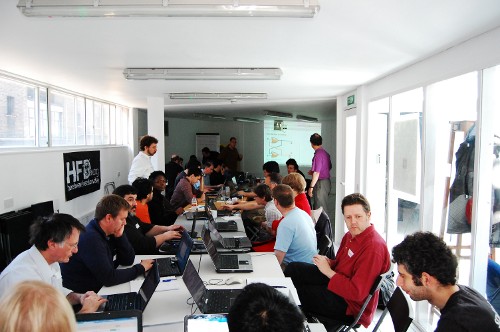
Feedback, contributions and discussion:
ChipHack Google Group
ChipHack 2017 Slack team.
An Introduction to FPGA Programming

ChipHack aims to provide a gentle introduction to FPGA programming using the Verilog hardware description language (HDL) and is:
- a set of learning materials and workshop notes; and
- an event.
No prior experience with HDLs and FPGA workflows is assumed, but some programming experience and an understanding of basic digital electronics is required.
Next event
There are no future events currently planned.
Previous events
6-8 September 2017. Hebden Bridge Town Hall, Hebden Bridge (UK). Held as part of the Wuthering Bytes Festival and sponsored by the BCS Open Source Specialist Group and Computer Conservation Society. This event adopted the newer Mystorm FPGA development board. More details of this particular event can be found on the ChipHack/EDSAC Challenge page.
24-25 May 2014. Makespace, Cambridge (UK). As with the first event, this also used the DE0 Nano FPGA board and OpenRISC. [event page]
20-21 April 2013. The first ever ChipHack event held at the Centre for Creative Collaboration, London (UK) — as part of Hardware Freedom Day. This workshop used the DE0 Nano FPGA board and culminated in bringing up the OpenRISC processor. [event page] [photos] [video]
Organize your own event
Anyone can organise a ChipHack event and this is encouraged. All the materials are freely available. The organising team will need to have some Verilog/FPGA experience. A set of MyStorm boards are held by the BCS Open Source Specialist Group, and can be borrowed for appropriate UK events.
Learning materials and workshop notes
The materials and supporting workshop notes were originally developed for the first ever ChipHack event and have been updated since.
All the source materials can be found on the GitHub chiphack repository and wiki.
Note that these are under development, so may not be entirely suitable for unsupported use.
Some of the slide decks are prepared using Hieroglyph, and can be viewed directly on this website as either HTML pages or slides. Others are provided as plain PDF.
- MyStorm Setup: html, slides.
- Basic Verilog: html, slides.
- Combinatorial Verilog: html, slides.
- Sequential Verilog: html, slides.
- UART design html, slides.
- Martin Campbell-Kelly on the history of EDSAC: part 1 PDF.
- Martin Campbell-Kelly on the history of EDSAC: part 2 PDF.
- Bill Purvis's EDSAC in Verilog PDF.
- Recreating EDSAC peripherals html, slides.
- Hatim Kanchwala's EDSAC design html, slides.
- Kevin Murrell on the EDSAC replica project PDF.
Contributors
- Andrew Back (Embecosm)
- Julius Baxter (FOSSi)
- Jeremy Bennett (Embecosm)
- Mary Bennett (Embecosm)
- Peter Bennett (Embecosm)
- Ken Boak
- Martin Campbell-Kelly (CCS)
- Simon Cook (Embecosm)
- Saar Drimer (Boldport)
- Dan Gorringe
- Hatim Kanchwala (GSoC)
- Omer Kilic (Ubiquiti Networks)
- Richard Miller (BCS OSSG)
- Kevin Murrell (CCS)
- Bill Purvis (CCS)
- Philip Wagner (FOSSi)
- Al Wood